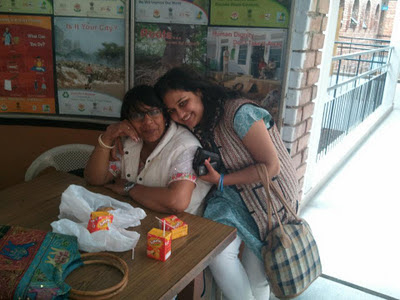Jagjit Singh. Bhupen Hazarika. Ustad Sultan Khan. These three were the unparalleled jewels who embellished the world of Indian Music and enhanced its glory. Each one of them belonged to a vastly different genre of Indian music, each one of them now no longer there to regale our souls with their powerful voices. At times like silk, and times haunting- I still cannot believe that we have lost these three precious voices in such quick succession, with barely any time to even recuperate in between.
While Jagjit Singh was popular among the masses because of the commercial success he could garner, the latter two are relatively lesser known names. Bhupen Hazarika, still, has had a marked presence on the musical scene in the north-east, but Ustad Sultan Khan's fame had remained confined to the dilettantes classical music- not so popular among the youth, till a long time. I myself was introduced to his magical voice rather late in life, when I had acquired enough respect and awe for Hindustani Classical Music. It was with the release of the endearingly melodious 'Piya Basanti' that his voice gained stupendous recognition among the young music listeners. Piya Basanti, with its soft musical curves, remains a top favorite till date.
Padmabhushan Ustad Sultan Khan first gained fame through his extraordinary mastery over the Sarangi, one of the most difficult traditional Indian string instruments, which he learnt under the tutelage of his father Gulab Khan. If you have not heard the notes of his Sarangi, trust me, you are missing out on one of the simplest pleasures of life. Besides being a glorious sarangi player, he is also a prolific singer. In fact, of all his works, what I hold favorite is his first vocal album, titled Sabras. In each song of that album, you can get a taste of the bewitching notes of his Sarangi, combined with the wondrous rustic beauty of his voice, set to either folk or classical tunes. 'Nadi Re Kinaare' is my pick from them all.
He sang only a limited number of film songs. His most famous is perhaps 'Albela Sajan' from Hum Dil De Chuke Sanam, a age old classical melody which gained effortless commercial success. 'Jhin-min-jheeni' from Maqbool also owes a mellifluous sufi section in the song to Ustad ji's voice. Collaborating with the young voice of Shreya Ghoshal, he churned out one of the most celebrated non-film songs, 'Leja leja', which I find myself humming very often while doing my daily chores. He is one of those artists I have followed with a pious fervour. Like was the case with Jagjit Singh, an attempt to imitate his songs to the last little harkat has been a source of immense musical learning for me.
One of the most-read articles on my blog is Kate Nahi Raat Mori, a post which extols the eponymous song set to his very voice. If there had to be just one song I could recommend to someone oblivious to the charms of Ustad ji's voice, it would be this one. A lot many people landed on the earlier post while searching for its lyrics, as my blog stats later revealed. I'll end this post with the lyrics of the same song, which continuously reverberated in the background as I wrote this post. Praying for his soul.
While Jagjit Singh was popular among the masses because of the commercial success he could garner, the latter two are relatively lesser known names. Bhupen Hazarika, still, has had a marked presence on the musical scene in the north-east, but Ustad Sultan Khan's fame had remained confined to the dilettantes classical music- not so popular among the youth, till a long time. I myself was introduced to his magical voice rather late in life, when I had acquired enough respect and awe for Hindustani Classical Music. It was with the release of the endearingly melodious 'Piya Basanti' that his voice gained stupendous recognition among the young music listeners. Piya Basanti, with its soft musical curves, remains a top favorite till date.
Padmabhushan Ustad Sultan Khan first gained fame through his extraordinary mastery over the Sarangi, one of the most difficult traditional Indian string instruments, which he learnt under the tutelage of his father Gulab Khan. If you have not heard the notes of his Sarangi, trust me, you are missing out on one of the simplest pleasures of life. Besides being a glorious sarangi player, he is also a prolific singer. In fact, of all his works, what I hold favorite is his first vocal album, titled Sabras. In each song of that album, you can get a taste of the bewitching notes of his Sarangi, combined with the wondrous rustic beauty of his voice, set to either folk or classical tunes. 'Nadi Re Kinaare' is my pick from them all.
 |
| A still from Leja Leja, from the album Ustad And The Divas |
One of the most-read articles on my blog is Kate Nahi Raat Mori, a post which extols the eponymous song set to his very voice. If there had to be just one song I could recommend to someone oblivious to the charms of Ustad ji's voice, it would be this one. A lot many people landed on the earlier post while searching for its lyrics, as my blog stats later revealed. I'll end this post with the lyrics of the same song, which continuously reverberated in the background as I wrote this post. Praying for his soul.
Kate nahi raat mori,
Piya Tore Kaaran, kaaran.
Kaare-kaare baadal chaaye,
Dekh dekh ji lalchaaye,
Kaise aaoon paas tihaare,
Bhool gaye more saajan.
Bheega bheega mausam aaya,
Piya ka sandesa laaya,
Manwa ko chain na aawe,
Tarse hai mori raina.
 |
| In the colors of his land. Ustad Sultan Khan belonged to Jodhpur, and was cremated there yesterday. |


















